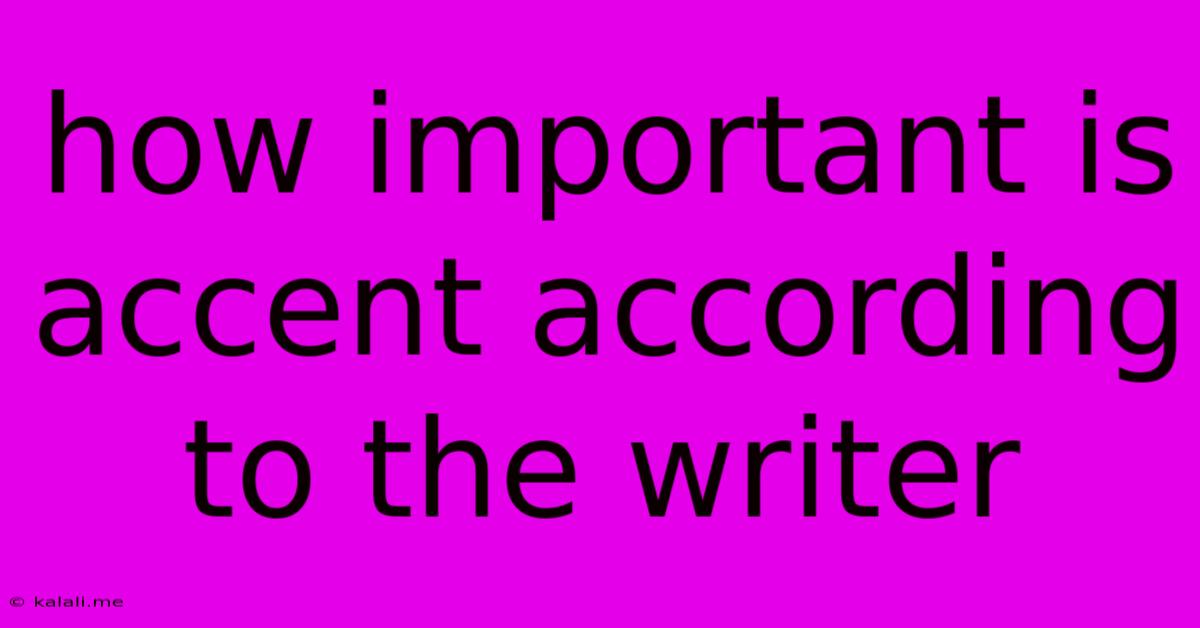How Important Is Accent According To The Writer
Kalali
Jun 03, 2025 · 3 min read

Table of Contents
The Unsung Hero of Storytelling: Why Accent Matters to a Writer
Accents. They're more than just a quirky pronunciation; they're a powerful tool in a writer's arsenal, capable of enriching characterization, setting atmosphere, and even driving plot. Ignoring accent in your writing is like ignoring the color in a painting – you lose a significant layer of depth and meaning. This article explores why accent is so crucial to a writer, regardless of genre.
Why Accent Matters More Than You Think
The importance of accent often gets overlooked in the writing process. Many writers focus on dialogue, plot, and character development, but fail to recognize the subtle yet profound impact of accurately portraying accents. A well-rendered accent isn't just about adding a few phonetic quirks; it's about painting a vivid picture of a character's background, upbringing, and personality. Think about it: a character's accent can instantly reveal information about their:
- Geographical origin: A thick Boston accent immediately places a character within a specific cultural context, hinting at their family history and social environment. Similarly, a Southern drawl, a Scottish brogue, or a Cockney accent instantly transports the reader to a different place and time.
- Socioeconomic background: The way someone speaks can reflect their education level, social class, and even their professional background. A refined accent might signal privilege, while a more working-class accent could convey resilience and hard work.
- Personality and emotional state: Accent can also be used to reveal a character's personality traits. A hesitant, soft-spoken accent might suggest shyness or insecurity, whereas a bold, confident accent could indicate strength and assertiveness. Even subtle shifts in accent within a single character can reflect their changing emotions or circumstances.
Beyond Phonetics: The Art of Accenting Your Prose
Representing accent in writing is a delicate art. Overdoing it can lead to caricature and frustrate the reader. The key is subtlety and nuance. Instead of relying solely on phonetic spellings (which can quickly become overwhelming and distracting), consider these alternative techniques:
- Dialogue tags: Use descriptive dialogue tags such as “she drawled,” “he muttered,” or “she exclaimed in a thick Irish brogue” to subtly hint at a character’s accent without excessive phonetic representation.
- Descriptive phrases: Weave in subtle descriptions of the character's speech patterns within the narrative, such as "his words tumbled out in a rush of rapid-fire Glaswegian," or "her voice, soft as a summer breeze, carried a distinct hint of the Caribbean."
- Word choice and sentence structure: A character’s accent might influence their vocabulary and sentence structure. Consider using slang, idioms, or grammatical constructions specific to a particular region or social group to add authenticity.
The Impact on Immersive Storytelling
Mastering the art of incorporating accent into your writing elevates your storytelling to a new level. By accurately and subtly portraying accents, you create a more immersive and believable world for your readers. They'll feel more connected to your characters, more invested in their stories, and ultimately, more satisfied with the reading experience. In short, neglecting accent is neglecting a powerful opportunity to enhance your narrative and connect with your audience. Embrace the nuance, the subtlety, and the rich tapestry of human speech – it’s a gift to your writing, and to your readers.
Latest Posts
Latest Posts
-
Brownie Mix In Mini Muffin Pan
Jun 05, 2025
-
How Long Does It Take For Wood Stain To Dry
Jun 05, 2025
-
How Do You Say Settings In Spanish
Jun 05, 2025
-
How To Remove Rust Stains From Bathtub
Jun 05, 2025
-
You Scratch My Back And I Ll Scratch Yours
Jun 05, 2025
Related Post
Thank you for visiting our website which covers about How Important Is Accent According To The Writer . We hope the information provided has been useful to you. Feel free to contact us if you have any questions or need further assistance. See you next time and don't miss to bookmark.